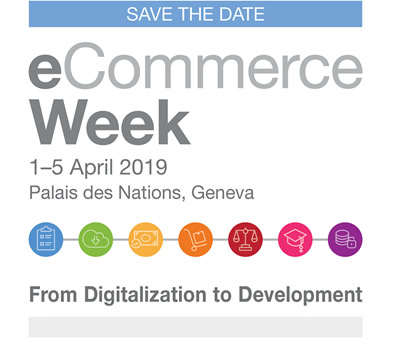Parallel event on digital inclusion for persons with disabilities
1 Apr 2019 13:30h - 15:00h
Event report
[Read more session reports and live updates from the UNCTAD E-commerce Week]
The conference Parallel Event on Digital Inclusion for Persons with Disabilities was held in Geneva, Switzerland, on 1 April 2019. The session covered digital inclusion and sustainable development in issues related to people with disabilities.
As a way to begin the session the moderator, Ms Corinne Momal-Vanian (Director of the Division of Conference Management UNOG), talked about the inequalities that those with disabilities face and the need of an established future environment with access to all people. The first panellist, Mr Diego Aulestia (Ambassador and Permanent Representative of Ecuador to WTO and UNCTAD President of the Group of 77), highlighted the movements of the UN towards a more inclusive treaty by the Convention on the Rights of Persons with Disabilities. Aulestia also expressed his satisfaction with the technological advancements that have been taking place in recent years to aid those with disabilities, more specifically the app that was showcased in the session SpeakLiz. Ms Pilar Fajarnes (a member of UNCTAD) highlighted the importance of reaching the sustainable development goal (SDG) 10 by 2030 to ensure that the disabled have access to rights and can fully participate in society. In more recent years this group has made progress. However, they still face barriers that prevent their full inclusion in society such as the lack of quality education that accommodates for disabilities, employment, and decision making. The disabled represent about 15% of the global population mostly found in developing countries and thus the exclusion from decision making is not sustainable. A technological advancement such as SpeakLiz is key since it acts as a facilitator to advance their empowerment.
For the majority of the session Mr Hugo Jacome (Co-Founder and President of the TALOV startup) spoke about the application made using artificial intelligence to allow deaf and blind people to be better integrated into society. SpeakLiz and SpeakLiz-Vision are applications that are available in the major app stores for Android and iOS devices that help the disabled tackle daily life challenges without needing human assistance. There was a demonstration by Jacome on how the app works. SpeakLiz was able to read the Ecuadorian Sign Language of Jacome and translate it out loud to English to the audience within a matter of seconds. It was also able to analyse the desktop monitor in front of Jacome and verbally state the object and the distance from the user. Both these applications are in 35 languages to facilitate global interactions between the disabled. The aid of technology will increase the self-sufficiency of the disabled and as a result less burden will be placed on the governments, and they are able to represent a larger more accurate portion of the global economy.
By Jainee Feliz-Cabrera
Related topics
Related event

eCommerce Week 2019: From Digitalization to Development
1 Apr 2019 15:45h - 5 Apr 2019 15:45h
Geneva, Switzerland
